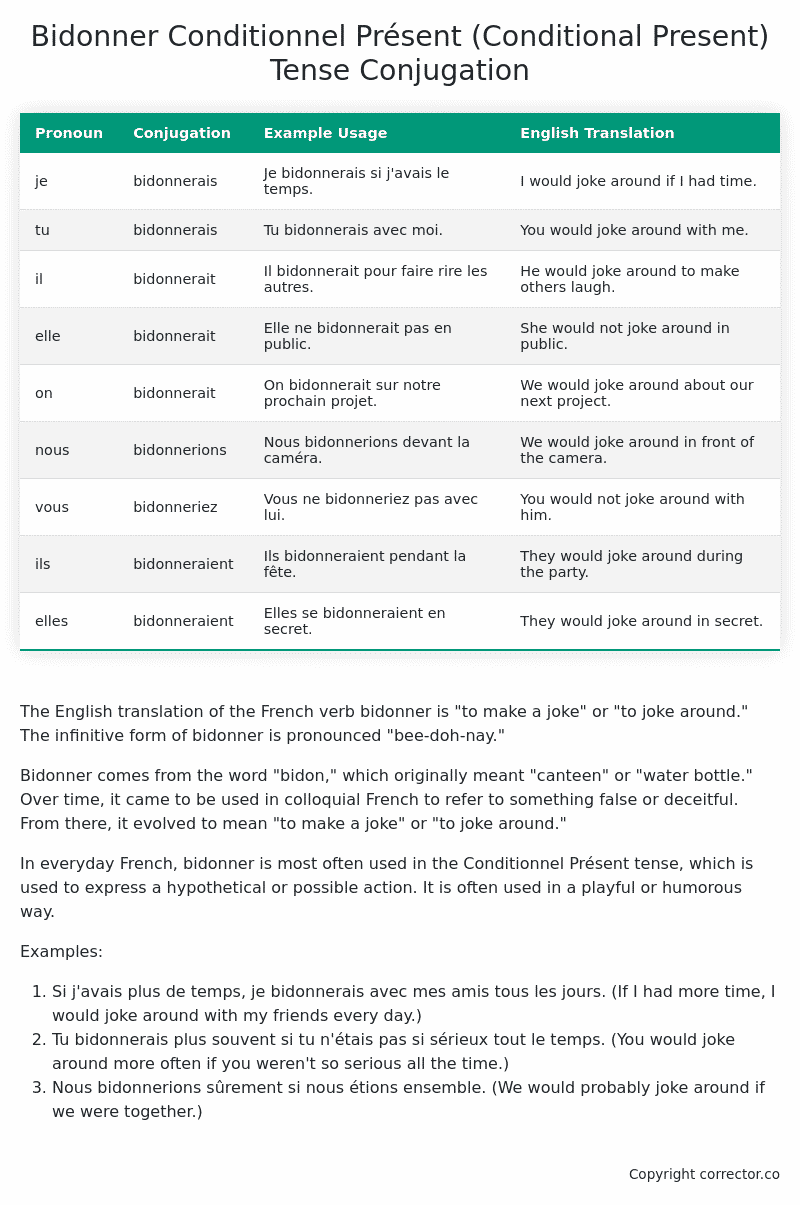Conditionnel Présent (Conditional Present) Tense Conjugation of the French Verb bidonner
Introduction to the verb bidonner
The English translation of the French verb bidonner is “to make a joke” or “to joke around.” The infinitive form of bidonner is pronounced “bee-doh-nay.”
Bidonner comes from the word “bidon,” which originally meant “canteen” or “water bottle.” Over time, it came to be used in colloquial French to refer to something false or deceitful. From there, it evolved to mean “to make a joke” or “to joke around.”
In everyday French, bidonner is most often used in the Conditionnel Présent tense, which is used to express a hypothetical or possible action. It is often used in a playful or humorous way.
Examples:
- Si j’avais plus de temps, je bidonnerais avec mes amis tous les jours. (If I had more time, I would joke around with my friends every day.)
- Tu bidonnerais plus souvent si tu n’étais pas si sérieux tout le temps. (You would joke around more often if you weren’t so serious all the time.)
- Nous bidonnerions sûrement si nous étions ensemble. (We would probably joke around if we were together.)
Table of the Conditionnel Présent (Conditional Present) Tense Conjugation of bidonner
| Pronoun | Conjugation | Example Usage | English Translation |
|---|---|---|---|
| je | bidonnerais | Je bidonnerais si j’avais le temps. | I would joke around if I had time. |
| tu | bidonnerais | Tu bidonnerais avec moi. | You would joke around with me. |
| il | bidonnerait | Il bidonnerait pour faire rire les autres. | He would joke around to make others laugh. |
| elle | bidonnerait | Elle ne bidonnerait pas en public. | She would not joke around in public. |
| on | bidonnerait | On bidonnerait sur notre prochain projet. | We would joke around about our next project. |
| nous | bidonnerions | Nous bidonnerions devant la caméra. | We would joke around in front of the camera. |
| vous | bidonneriez | Vous ne bidonneriez pas avec lui. | You would not joke around with him. |
| ils | bidonneraient | Ils bidonneraient pendant la fête. | They would joke around during the party. |
| elles | bidonneraient | Elles se bidonneraient en secret. | They would joke around in secret. |
Other Conjugations for Bidonner.
Le Present (Present Tense) Conjugation of the French Verb bidonner
Imparfait (Imperfect) Tense Conjugation of the French Verb bidonner
Passé Simple (Simple Past) Tense Conjugation of the French Verb bidonner
Passé Composé (Present Perfect) Tense Conjugation of the French Verb bidonner
Futur Simple (Simple Future) Tense Conjugation of the French Verb bidonner
Futur Proche (Near Future) Tense Conjugation of the French Verb bidonner
Plus-que-parfait (Pluperfect) Tense Conjugation of the French Verb bidonner
Passé Antérieur (Past Anterior) Tense Conjugation of the French Verb bidonner
Futur Antérieur (Future Anterior) Tense Conjugation of the French Verb bidonner
Subjonctif Présent (Subjunctive Present) Tense Conjugation of the French Verb bidonner
Subjonctif Passé (Subjunctive Past) Tense Conjugation of the French Verb bidonner
Subjonctif Imparfait (Subjunctive Imperfect) Tense Conjugation of the French Verb bidonner
Subjonctif Plus-que-parfait (Subjunctive Pluperfect) Tense Conjugation of the French Verb bidonner
Conditionnel Présent (Conditional Present) Tense Conjugation of the French Verb bidonner (this article)
Conditionnel Passé (Conditional Past) Tense Conjugation of the French Verb bidonner
L’impératif Présent (Imperative Present) Tense Conjugation of the French Verb bidonner
L’infinitif Présent (Infinitive Present) Tense Conjugation of the French Verb bidonner
Struggling with French verbs or the language in general? Why not use our free French Grammar Checker – no registration required!
Get a FREE Download Study Sheet of this Conjugation 🔥
Simply right click the image below, click “save image” and get your free reference for the bidonner Conditionnel Présent tense conjugation!

Bidonner – About the French Conditionnel Présent (Conditional Present) Tense
Formation
Common Everyday Usage Patterns
Expressing Polite Requests
Expressing Hypothetical Situations
Expressing Doubt or Uncertainty
Interactions with Other Tenses
Present Tense
Past Tense
Future Tense
Conditional Perfect
Summary
Want More?
I hope you enjoyed this article on the verb bidonner. Still in a learning mood? Check out another TOTALLY random French verb conjugation!


